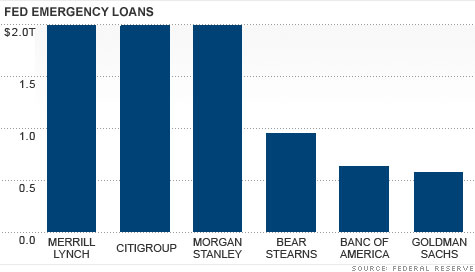Current limitations of Fed Audit:
The Government Accounting Office does not have complete access to all aspects of the Federal Reserve System. The law excludes the following areas from GAO inspections (31 USCA §714):
(1) transactions for or with a foreign central bank, government of a foreign country, or nonprivate international financing organization;
(2) deliberations, decisions, or actions on monetary policy matters, including discount window operations, reserves of member banks, securities credit, interest on deposits, open market operations;
(3) transactions made under the direction of the Federal Open Market Committee; or
(4) a part of a discussion or communication among or between members of the Board of Governors and officers and employees of the Federal Reserve System related to items.
Yeah, right - and you totally misunderstand the purpose of what you just quoted.
And I also find it hypocritical of you to
conveniently leave out the following sections, part of which I quote here:
(c)
(1) Except as provided in this subsection, an officer or employee of the Government Accountability Office may not disclose information identifying an open bank, an open bank holding company, or a customer of an open or closed bank or bank holding company. The Comptroller General may disclose information related to the affairs of a closed bank or closed bank holding company identifying a customer of the closed bank or closed bank holding company only if the Comptroller General believes the customer had a controlling influence in the management of the closed bank or closed bank holding company or was related to or affiliated with a person or group having a controlling influence.
(2) An officer or employee of the Office may discuss a customer, bank, or bank holding company with an official of an agency and may report an apparent criminal violation to an appropriate law enforcement authority of the United States Government or a State.
(3) Except as provided under paragraph (4), an officer or employee of the Government Accountability Office may not disclose to any person outside the Government Accountability Office information obtained in audits or examinations conducted under subsection (e) and maintained as confidential by the Board or the Federal reserve banks.
(4) This subsection shall not—
(A) authorize an officer or employee of an agency to withhold information from any committee or subcommittee of jurisdiction of Congress, or any member of such committee or subcommittee; or
(B) limit any disclosure by the Government Accountability Office to any committee or subcommittee of jurisdiction of Congress, or any member of such committee or subcommittee.
(d)
(1) To carry out this section, all records and property of or used by an agency, including samples of reports of examinations of a bank or bank holding company the Comptroller General considers statistically meaningful and workpapers and correspondence related to the reports shall be made available to the Comptroller General. The Comptroller General shall have access to the officers, employees, contractors, and other agents and representatives of an agency and any entity established by an agency at any reasonable time as the Comptroller General may request. The Comptroller General may make and retain copies of such books, accounts, and other records as the Comptroller General determines appropriate. The Comptroller General shall give an agency a current list of officers and employees to whom, with proper identification, records and property may be made available, and who may make notes or copies necessary to carry out an audit.
(2) The Comptroller General shall prevent unauthorized access to records, copies of any record, or property of or used by an agency that the Comptroller General obtains during an audit.
(3)
(A) For purposes of conducting audits and examinations under subsection (e), the Comptroller General shall have access, upon request, to any information, data, schedules, books, accounts, financial records, reports, files, electronic communications, or other papers, things or property belonging to or in use by—
(i) any entity established by any action taken by the Board described under subsection (e);
(ii) any entity receiving assistance from any action taken by the Board described under subsection (e), to the extent that the access and request relates to that assistance; and
(iii) the officers, directors, employees, independent public accountants, financial advisors and any and all representatives of any entity described under clause (i) or (ii); to the extent that the access and request relates to that assistance;
(B) The Comptroller General shall have access as provided under subparagraph (A) at such time as the Comptroller General may request.
(C) Each contract, term sheet, or other agreement between the Board or any Federal reserve bank (or any entity established by the Board or any Federal reserve bank) and an entity receiving assistance from any action taken by the Board described under subsection (e) shall provide for access by the Comptroller General in accordance with this paragraph.
(e) Notwithstanding subsection (b), the Comptroller General may conduct audits, including onsite examinations when the Comptroller General determines such audits and examinations are appropriate, of any action taken by the Board under the third undesignated paragraph of section 13 of the Federal Reserve Act (12 U.S.C. 343); with respect to a single and specific partnership or corporation.


